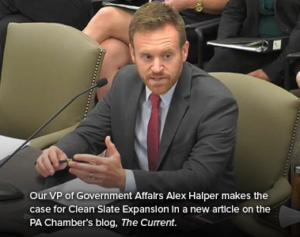 Back in 2018, first-of-its-kind Clean Slate legislation got its name because it provided a “clean slate” to workforce reentrants who could have low-level criminal records automatically sealed after a certain length of time as they worked to obtain employment. While the PA Chamber wasn’t historically a champion of criminal justice reform, our organization worked with a bipartisan group of lawmakers and ultimately backed the Clean Slate Law (Act 58 of 2018). The results have been overwhelmingly positive, with the law being held up as a national model and employers and job seekers agreeing that Clean Slate shouldn’t only continue, but expand as a way to resolve ongoing workforce challenges in Pennsylvania.
Back in 2018, first-of-its-kind Clean Slate legislation got its name because it provided a “clean slate” to workforce reentrants who could have low-level criminal records automatically sealed after a certain length of time as they worked to obtain employment. While the PA Chamber wasn’t historically a champion of criminal justice reform, our organization worked with a bipartisan group of lawmakers and ultimately backed the Clean Slate Law (Act 58 of 2018). The results have been overwhelmingly positive, with the law being held up as a national model and employers and job seekers agreeing that Clean Slate shouldn’t only continue, but expand as a way to resolve ongoing workforce challenges in Pennsylvania.
Workforce development is a major focus of the PA Chamber’s advocacy efforts, as we work to attract and retain the next generation of skilled and inspired workers. In a recent article on the PA Chamber’s blog The Current, Vice President of Government Affairs Alex Halper writes that criminal justice reform has become a feature of our workforce policy agenda.
“We’ve supported occupational licensure reform to make the law more clear and fair for incarcerated individuals and reentrants seeking career opportunities. We’ve supported legislation to reform probation rules and have successfully advocated for the inclusion of employment-specific provisions, including encouraging job training programs and helping probationers maintain employment,” he wrote, citing examples of the additional criminal justice reform measures the PA Chamber has pushed to enact since Clean Slate became law.
House Bill 1826, which was the recent subject of a public hearing that Halper testified in support of, would further expand Clean Slate to include certain low-level drug felonies, expand the categories of criminal records that are eligible for petition sealing by the courts, and shorten waiting periods for more minor convictions.